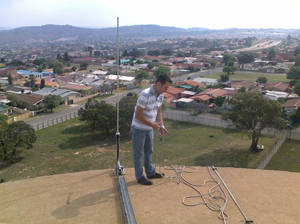|
One of South Africa’s most successful TETRA networks is a mission-critical regional system operated by City Power, the electricity distribution utility serving the Johannesburg area – a service of the city’s local authority. “We went live April 2010”, says Thabo Litsili, who manages the telecoms department, at the company’s modern headquarters in Johannesburg. “We’ve got 11 base station sites which cover the City Power Johannesburg region. The system is mainly used by the electricians for communication. We also use it for data to connect our Scada systems here.” The Scada system (Supervisory Control And Data Acquisition) is a type of industrial control network. Connected mainly through private fibre cables running alongside the power distribution lines, this equipment is used extensively by City Power’s engineers for the monitoring and control of electrical plant and other equipment at outlying substations. “We can remotely switch on and off, do operations remotely”, explains Mr Litsili. “We don’t have to be at the substations. And also we monitor the substations to check the power consumption, load levels and so on. That we can do remotely from here, which is the central control centre.” With the introduction of the TETRA radio system, some critical gaps in the Scada network have at last been bridged. “Most of the communication is done over fibre optic cables and we’re using TETRA only at remote stations where we don’t have any connectivity at all”, Mr Litsili continues. “The reason why we went this way is because we were using an old analogue system before, which had limitations. We then said, let’s go with TETRA, because with digital we can do voice as well as data. We couldn’t do data on the old analogue system.” Saving time With their extensive remote management system, City Power’s engineers can respond rapidly to changing demands on the electricity network and deal with emergencies as they arise. The area is prone to powerful electric storms and lightning strikes – and if a neighbourhood suddenly loses power, they can often restore it without having to send a technician out to investigate. And because of the area’s notoriously heavy peak-time road traffic, the savings in down-time can often be enormous. Here the inherent security of TETRA transmission, whether voice or data, is key benefit. “Especially in terms of, say, Scada, it’s very important information for us, so we don’t want any interruption or anybody listening in on it”, Mr Litsili says. ”For instance, if there are guys looking at a substation on a particular line, you have to switch it off, and you don’t want that to be interrupted. There are lives!” Another important function of the Scada system is access control at the remote sites, and protecting plant. Theft of electricity through unauthorized connections is plainly a troublesome problem: a poster campaign across the city appeals for information about miscreants. Furthermore, as in many countries, soaring metal prices are driving thefts of copper cable. Before the TETRA network was installed, City Power depended for its data needs on GPRS – but this offered no guarantee of reliable communication and it also proved quite costly. “It’s not a huge amount of data”, Mr Litsili concedes. “But at least with the TETRA system we’ve got ownership of the system – so if anything goes wrong, we are in control. With GPRS, we relied on third-party operators.” New applications Radio coverage of the TETRA network is still incomplete, though the department has very recently been given the go-ahead to install the remaining seven planned radio sites. But already it is saving money, even on ordinary voice calls by staff. “The guys were using cellphones, so we’ve seen some reduction in GSM costs”, Mr Litsili says. “Instead of phoning with a cellphone to the control centre, they are now using TETRA, which is free. “At the moment it’s just voice and data. But we are looking in the future to integrate it with our dispatching system – the MDT [mobile data terminal], which is automatic dispatching of electricians. It’s on a separate system now, but in future we’re looking at integrating it into TETRA.” Plans are also going ahead to manage the city’s street lighting system over TETRA, he continues. “What the system does is it monitors the street lights and with the system you are able to switch on and off. You can also check the status of the lights and it also tells you if, in a run, there are lights which are out or that are not working. You can see that on the system. It’s quite a nice system.”
|

 Built to offer efficient voice and data communications for electricity supply workers, a
Built to offer efficient voice and data communications for electricity supply workers, a